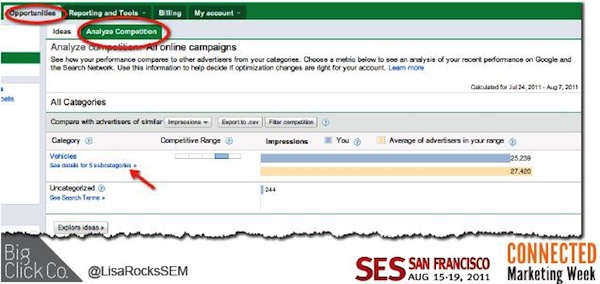
Analyzing your competitor’s PPC ads is a great way to extract data about how their company influences conversions. It’s also a way to analyze your own ads to see what’s missing.
Matt Van Wagner from Find Me Faster and SEM Strategy Consultant Lisa Raehsler lead a session at SES San Francisco that explored how search marketers can monitor their competition’s paid search ads to drive new strategies.
They were nice enough to sit down with me after their session and walk me through the process of analyzing a competitor’s PPC campaigns.
1. Define Who Your Competitors Are
There’s probably more than you think. Where are they and what do they know?
Sometimes your toughest offline competitors don’t exist online and your toughest online competitors don’t exist offline. Weird, but not uncommon.
2. Do a Quick Assessment of How Good They Are
How tech savvy they are on a scale from 1 – 5? Check out their webpage, landing pages, social media sites, LinkedIn page, etc.
Are they leveraging retargeting ads? Following paid search best practices?
Note: Monitoring their site, LinkedIn page, and Twitter handles are great free ways to find out any changes or advancements they’ve made in paid search advertising. Use Google Alerts to your advantage.
What are their strengths and weaknesses in comparison to yours?
Who are they targeting? Are they shooting for premiere small, or businesses in the middle?
If they are the premier leader in your space, where are you in the ecosystem? What are their primary messages? Can you counter with a different message or overpower them with a better way to deliver the same message?
Are they countering your messaging or just doing their own thing? In other words, how aware are they of their online programs? How quickly do they react to changes you make?
3. How do They Sell?
What’s their value proposition and how is that different than your business?
With that data, how can you leverage your value proposition in your paid search ads?
Are they saying something that you’ve been trying to say for years?
High quality / high price vs convenience, types of competitors. Who are they targeting? If they’re the premium leader, who you are, where are you in the ecosystem?
Are they countering your message or are they just running their own thing?
4. What Do You Want to Extract From Their Data?
Do you want to exact ad copy? Website data? Keywords?
Here are some things you can analyze:
- Meta tags
- Meta data
- Text analysis of their landing page / web page
- Ads
5. Optimize
What did you learn from the analysis that you’d like to incorporate into your own campaigns?
Keep in mind that your findings from your competitors should be taken as directional and not absolute. Some competitive tools report wildly inaccurate estimates of CPC, ad spend, and so on.
Some changes will be obvious simply because it’s a keyword or group of keywords that you missed. Others may be more high level and related to shifts in strategy or messaging.
With any larger strategy changes, it’s essential to test the new components of your strategy with the old to gauge performance. Allow the testing to run for about a month, then optimize and continue to monitor your competition for new trends.
Helpful Tools For Competitive Analysis
Van Wagner and Raehsler suggested advertisers investigate these tools:
Keyword Discovery Tools
And here are some more to check out:
